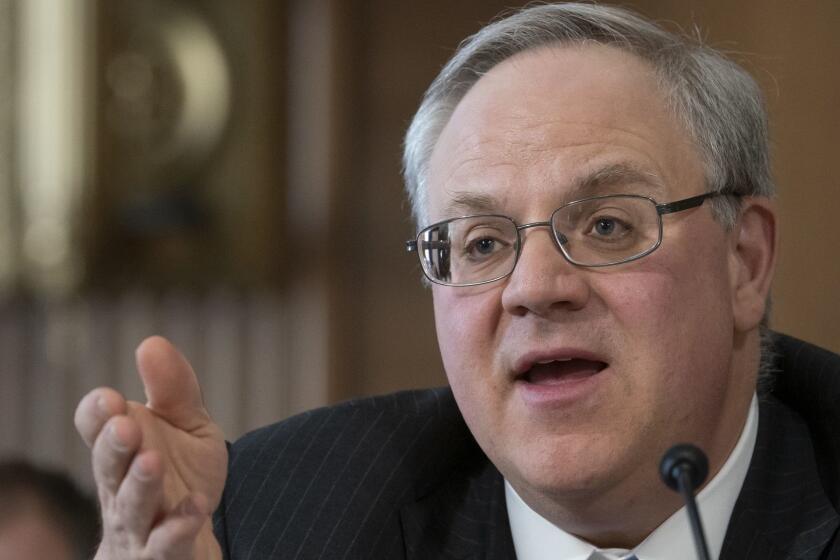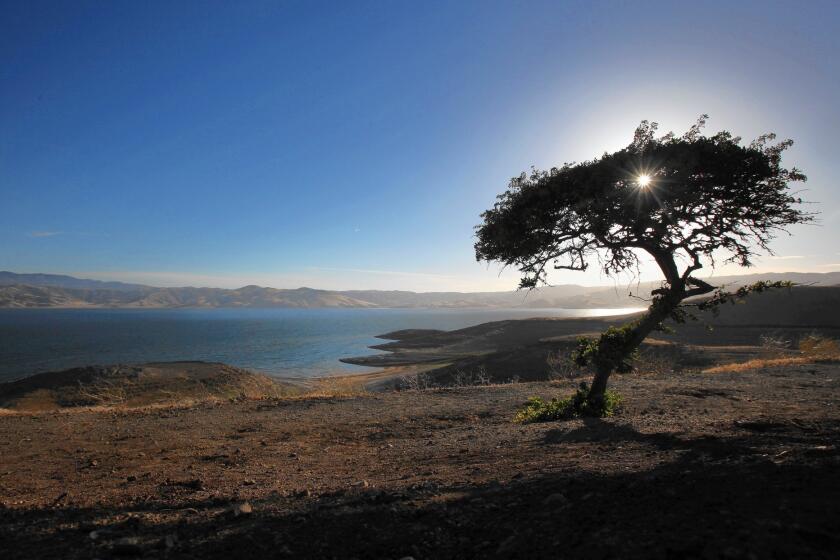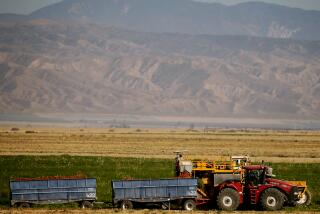Column: Interior Secretary Bernhardt’s previous job raises questions about a deal for his ex-client
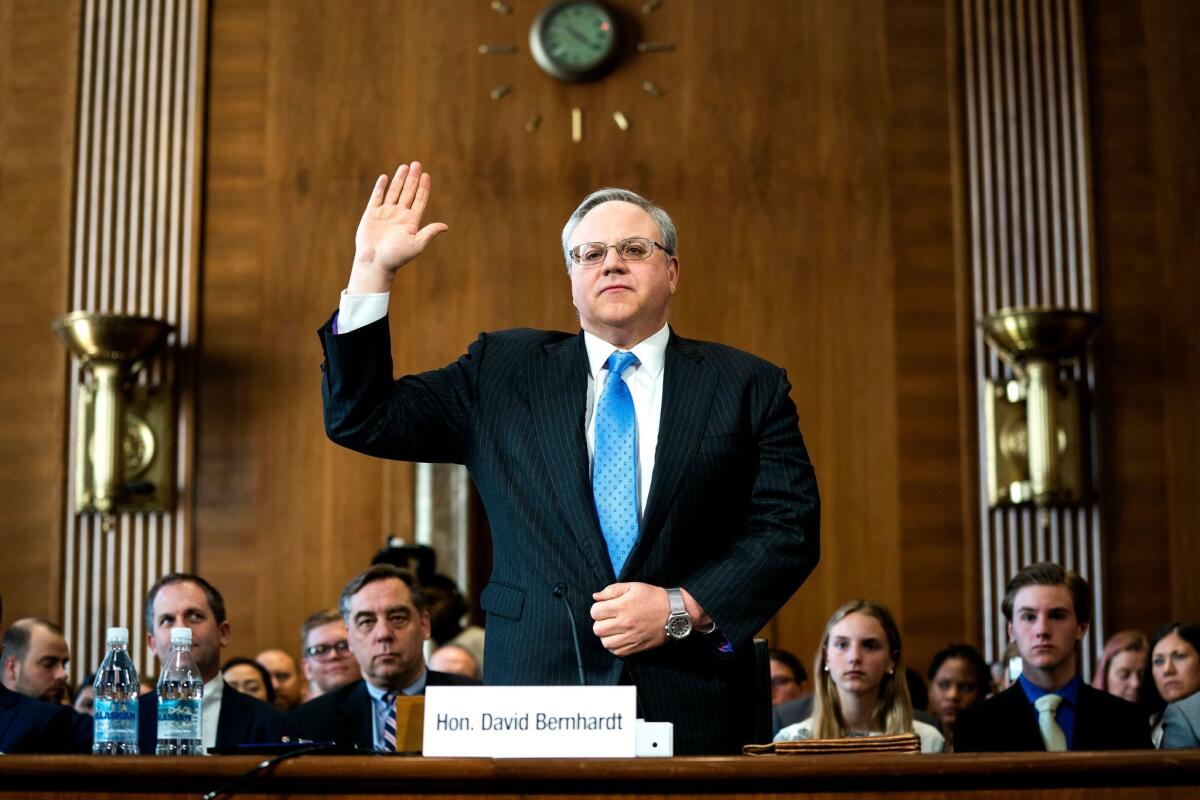
- Share via
The Department of the Interior wants us to know that Interior Secretary David Bernhardt has had nothing to do with a contract that will give one of his former lobbying clients, the giant Westlands Water District, permanent access to lucrative federal irrigation water supplies.
Westlands wants us to know the same thing. “Mr. Bernhardt was not involved in any of the discussions” over the contract, Westlands General Manager Tom Birmingham told me. “This has nothing to do with David Bernhardt.”
‘We don’t know if Interior is trying to give Westlands a sweetheart deal by forgiving them some of their debt or who knows what else. The public is kept in the dark of how taxpayer money is going to be used.’
— Doug Obegi, Natural Resources Defense Council
There are many reasons to be concerned about the award of a permanent water contract to an entity as big and important as Westlands. The permanent contract would supplant a series of two-year contracts that have governed Westlands’ access to federal water in recent years, diminishing the opportunity for public review.
“Water contract negotiations and renewals have always been a mechanism for public scrutiny and ensuring that the contracts for huge blocks of public water serve the public interest,” says Rep. Jared Huffman (D-San Rafael). That scrutiny is even more important now, since the future of California’s water supply is more doubtful than ever before because of climate change and continued population growth.
Bernhardt’s fingerprints aren’t detectable on the Westlands contract. But the miasma of corruption within the Interior Department has become so thick that almost every major decision today, even those that look innocent on the surface, makes one wrinkle one’s nose. This is why a failure to stringently police public ethics can be so corrosive — nothing escapes the stench.
The tone was set by Bernhardt’s predecessor as Interior secretary, Ryan Zinke, who was forced out of office amid accusations of ethical misdeeds including favors for friends and business associates and politically motivated decision-making.
Is the department’s award of a lucrative permanent water contract to Westlands, Bernhardt’s former client, just a coincidence? Let’s examine just how influential Westlands is in Washington and what benefits it gains from the contract — which is facilitated by a law that Bernhardt helped to write as a Westlands lobbyist.
When it comes to acting Interior Secretary David Bernhardt’s involvement in plans to loosen environmental restrictions on water flows for Central Valley farmers, a few things are clear and many more are murky.
What’s at stake in the deal is how much taxpayers will be on the hook for a water deal benefiting some of the richest corporate farms in the country, and how this proposed deal will limit the rights of competing water users in California, including fishermen and -women, industrial users, and residents statewide.
For context, you should know that Westlands is the largest agricultural water district in the country, a 614,000-acre behemoth that sprawls 74 miles along the east side of Interstate 5 just west of Fresno and produces about $1 billion in crops per year. It’s the largest single customer of the federal Central Valley Project, a network of California dams, reservoirs and aqueducts launched in 1938 and managed by Interior’s Bureau of Reclamation.
The right-wing campaign to demonize the tiny delta smelt so Big Ag can get more water continues, ignorantly
Westlands’ clout in Washington isn’t entirely an artifact of the Trump era. “As incestuous as the current relationship is between Westlands and Interior,” Huffman says, “they’ve always had tremendous influence over the Bureau of Reclamation, even under Democratic administrations.”
Bernhardt’s actions have been scrutinized for conflicts of interest by environmentalists and other critics not merely because of his career as a lobbyist for oil, gas and water interests, all of which fall under his government jurisdiction, but because he’s been a point man in Trump’s attack on environmental statutes such as the Endangered Species Act — a law over which Bernhardt once sued the Interior Department on Westlands’ behalf.
There have also been persistent complaints that Bernhardt hasn’t hewed closely enough to his pledge to recuse himself from decisions affecting his former clients. The Interior Department’s ethics officials seem to parse the conflict-of-interest rules very narrowly when it comes to some decisions that plainly benefit those former clients.
The Interior Department’s efforts to increase water deliveries to Central Valley farm contractors such as Westlands at the expense of endangered species, for example, create “the exact outcome [Bernhardt] lobbied for on behalf of Westlands for years prior to entering government service,” the anticorruption Campaign Legal Center noted in a 15-page letter (plus exhibits) to the department’s inspector general.
The inspector general’s office has opened an investigation of the center’s complaint and others about Bernhardt, but has not announced any resolution. Department spokespersons consistently have maintained that Bernhardt is completely compliant with his ethics obligations.
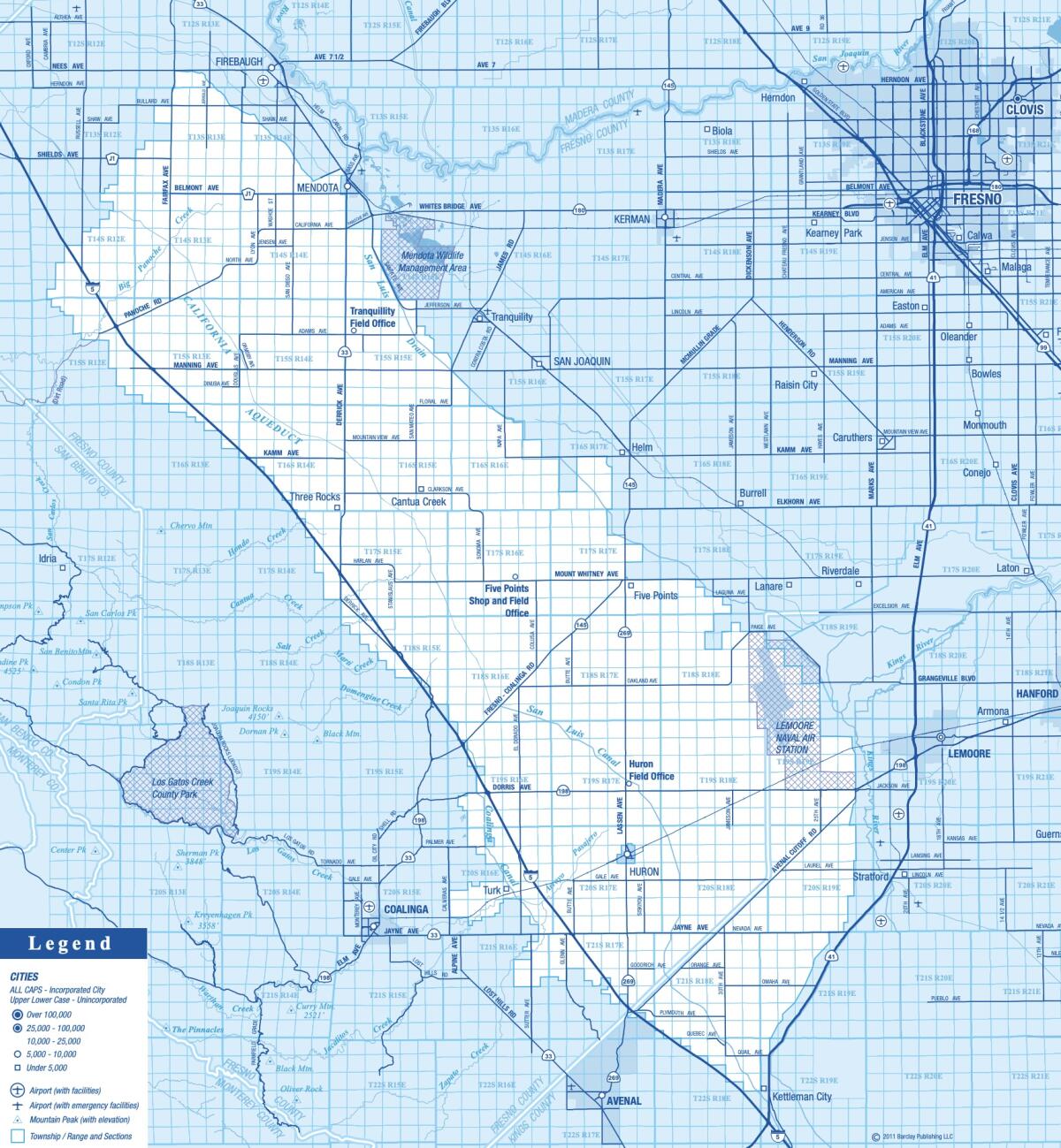
The contract at issue would give Westlands permanent access to as much as 1.15 million acre-feet of water per year from the government’s Central Valley Project. That’s twice as much water as the city of Los Angeles consumes in an average year. An acre-foot is about as much water as one or two average households consume in a year.
Much of the supply comes through the Sacramento-San Joaquin River Delta, the fulcrum of water supply for the Central Valley, Southern California, and the water ecology of Northern California. These are all competing claimants to the water in a zero-sum contest. Providing water for some users — Central Valley growers, say — means reducing supplies to the others.
When President Trump nominated David Bernhardt for a top-level post at the Interior Department, environmentalists and water experts could see trouble ahead.
Westlands’ water rights aren’t inviolable — Reclamation can cut back its supply in dry years, even to zero. But in years with lesser cutbacks, the contract would entitle the district to a huge supply of water essential to the survival of its member agribusinesses. The existence of a permanent contract “increases the political pressure to divert more water to them from the delta,” says Doug Obegi, a California manager for the Natural Resources Defense Council.
The permanent contract is an outgrowth of the Water Infrastructure Improvements for the Nation Act, known as the WIIN Act.
The WIIN Act’s passage in December 2016 was an embarrassing episode of legislative manipulation. The act had originated as a bipartisan measure crafted by Sens. Barbara Boxer (D-Calif.) and James Inhofe (R-Okla.) to fund water projects nationwide, including a fix for the water system of Flint, Mich., which was poisoning residents from lead contamination.
At the last moment, however, provisions that would benefit Westlands and other big commercial water users in the West were added, in what Boxer called a “sneak attack” by Sen. Dianne Feinstein (D-Calif.) and then-House Majority Leader Kevin McCarthy (R-Bakersfield). Bernhardt, who then was a registered lobbyist for Westlands at the law firm Brownstein Hyatt Farber Schreck, had lobbied for the act.
Clout can be defined in many ways.
According to the letter from the Campaign Legal Center, even after he gave up his lobbying registration to join President Trump’s transition team at Interior, Bernhardt “edited a proposed ‘draft executive order’ for then-President-elect Donald Trump, and sent it to two Westlands officials.” The executive order pertained to freeing up Central Valley water supplies, using language that ended up almost unchanged in the WIIN Act itself.
Infuriated that the last-minute provisions would weaken the Endangered Species Act and other environmental laws to favor agribusinesses in the Central Valley, Boxer ended up staging a filibuster against her own bill as one of her last actions before retiring from the Senate. She failed, and the measure passed and was duly signed by President Obama.
The provisions that angered Boxer have obvious benefits for rich, thirsty and politically well-connected commercial agricultural entities such as Westlands. They allow federal officials to minimize environmental limitations so they can funnel more water to those users.
But another provision flew under the radar, at first. It allows the big water users to convert their short-term contracts to permanent contracts years ahead of schedule, by paying off the debt they owe to the federal government for the Central Valley Project’s construction in a few lump sums rather than over time.
On the surface this might not seem all that significant. “I’m baffled by the reaction,” says Birmingham, who argues that Westlands might have been entitled to convert its contract to permanent status by 2030 anyway. He says the public will benefit by getting its money — estimated at about $323 million — “on an expedited basis.”
Meanwhile, the permanent contract will relieve Westlands of acreage and cost restrictions that place limits on its water supply and govern pricing. Reclamation officials say the WIIN Act requires the prepaid funds to be spent on water infrastructure that will benefit other users in California.
Heather Sears has been fishing for salmon out of this unassuming coastal community for nearly two decades.
That’s a point Feinstein has made in her staunch defense of the WIIN Act. In fact, she has been trying on Capitol Hill to extend the measure for another five years past its sunset date in December 2021. Among her talking points is that allowing more districts to prepay their federal loans will “bring in additional revenue within the next 10 years” for the construction of new water storage, recycling and desalination projects.
Birmingham correctly points out that Westlands is only one of some 70 California water districts applying to convert their short-term contracts to permanent agreements. All are under pressure to complete their negotiations, because the WIIN Act sets a deadline of Dec. 16, 2021, to implement the contracts. But Westlands is the only district thus far to have completed its negotiations to the point that its tentative contract could be put out for public review, which happened on Oct. 24.
Critics of the deal complain that Reclamation has been stingy with hard information about the conversion’s terms. The agency didn’t make public background documents necessary to evaluating the contract terms until after a coalition of environmental groups demanded them in an Oct. 29 letter. Even then, critics say, the documents are woefully incomplete. They don’t specify key contract terms or incorporate an assessment of how much water Westlands actually needs — a critical issue because the acreage under cultivation within the district is shrinking, thanks to environmental concerns.
“The lack of transparency is really problematic,” says NRDC’s Obegi. “We don’t know if Interior is trying to give Westlands a sweetheart deal by forgiving them some of their debt or who knows what else. The public is kept in the dark of how taxpayer money is going to be used.”
Regional officials of the Bureau of Reclamation say they have had complete discretion to conduct the talks and have hewed closely to the dictates of the WIIN Act in reaching terms, without interference from Washington. When Bernhardt joined Interior, he listed Westlands and 24 other companies or organizations that he had represented and that therefore might pose potential conflicts of interest, but Interior ethics officials have said that Bernhardt might not have to recuse himself from decisions involving Westlands if the decisions involve broader policy issues.
But it’s a reflection of the suspicions raised by Bernhardt’s record and Westlands’ influence that almost no one in the environmental community believes that he has had no involvement with the water contract.
Interior’s managers “are smart enough to delegate this so they can pretend that it has nothing to do with David Bernhardt,” Huffman says. “But the career advancement of anyone who worked on any aspect of this depends on David Bernhardt. He’s at the top of the org chart.”
More to Read
Inside the business of entertainment
The Wide Shot brings you news, analysis and insights on everything from streaming wars to production — and what it all means for the future.
You may occasionally receive promotional content from the Los Angeles Times.

